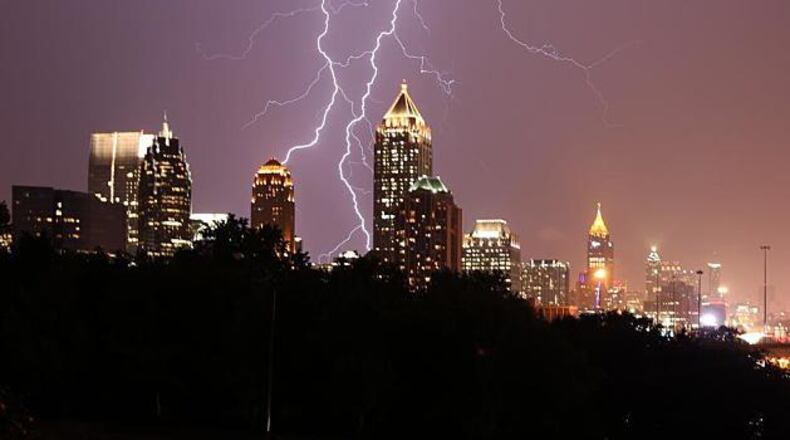As she swam in the waters off Tybee Island, a 15-year-old girl was struck by lightning. The teen’s death, believed to be the second this year caused by lightning, came June 12, just as the summer season kicked off.
On Wednesday, a Georgia teen died in a Florida hospital after being struck by lightning on July 17 while on vacation with his family.
Since 2010, 25 people on average have been struck and killed by lightning each year in the U.S., including 40 in 2016, according to the National Weather Service. In 2020, 17 were killed by lightning, including a 9-year-old Georgia girl.
While such deaths are down slightly in recent years, meteorologists warn late summer is a rainy time in metro Atlanta, and pop-up storms always pose a risk. Lightning safety should be taken seriously, experts say.
“As the storms develop, the first lightning they produce may come as a surprise because there hadn’t been any lightning up to that point,” Channel 2 Action News meteorologist Brad Nitz said.
It doesn’t have to be raining for lightning to strike, Nitz noted.
“Lightning can strike five miles, or even more sometimes, away from a thunderstorm,” he said. “As a rule of thumb, if you can hear thunder, you are close enough to the storm to be struck by lightning — even if it’s not raining where you are.”
According to the Atlanta-based Centers for Disease Control and Prevention, the odds of being struck by lightning are around 1 in 500,000 in any given year. Fortunately, the majority of those who are hit survive. But those in the southeastern U.S. are among the highest risk, the CDC says.
Last summer, a Georgia girl was killed and her sister injured when their family was walking and lightning struck, according to investigators.
As the storm approached in Moultrie on the afternoon of July 3, Nicol Mateo-Pedro’s mother and older sister took shelter under a wooden canopy, police told media outlets. But lightning struck a tree nearby and hit Nicol, who died at a local hospital.
The first lightning death this year is believed to be a 71-year-old New Jersey man, struck as he played golf, according to investigators.
Michael J. Ward practiced dentistry for 25 years before becoming a math teacher, the Burlington County Times newspaper reported.
“I try to do (for students) what worked for my dental practice patients,” Ward said in a Rutgers University profile in 2007. In teaching algebra, Ward said, he explained the math “in a calm, reassuring manner what was happening at each stage of the procedure.”
In mid-July, another golfer was killed by lightning, according to Pennsylvania investigators. Joseph Slivinski, 71, of Blakely, was struck around 1:30 p.m. on the Pine Hills Golf Course in Taylor, media outlets reported.
According to the CDC, around 85% of those killed by lightning are men. People aged 15–34 years account for about 41% of all lightning strike victims.
Fewer people have been killed by lightning so far this year, though there’s no obvious reason, meteorologists say.
It could be that there’s more public awareness about the dangers of lightning, or the technology advances, such as with cellphone weather apps, mean fewer people are caught off guard, Channel 2 meteorologist Brian Monahan said. Being prepared and understanding the dangers of lightning are keys to stay safe, experts advise.
The Severe Weather Team 2 app can be downloaded online on wsbtv.com. Weather alerts are also available through the AJC news app, which can be downloaded at AJC.com.
STAYING SAFE DURING LIGHTNING
1. If you hear thunder, lightning is close enough to strike you.
2. When you hear thunder, immediately move to safe shelter: a substantial building with electricity or plumbing or an enclosed, metal-topped vehicle with windows up.
3. Stay in a safe shelter at least 30 minutes after you hear the last sound of thunder.
4. If you’re inside, stay off electrical equipment that puts you in direct contact with electricity and stay away from windows and doors. Avoid sinks, baths and faucets.
5. If you’re caught outside with no safe shelter, get off elevated areas and never shelter under a tree. Immediately get out and away from ponds, lakes and other bodies of water. Stay away from objects that conduct electricity, such as barbed wire or power lines.
Source: National Weather Service
About the Author
Keep Reading
The Latest
Featured



